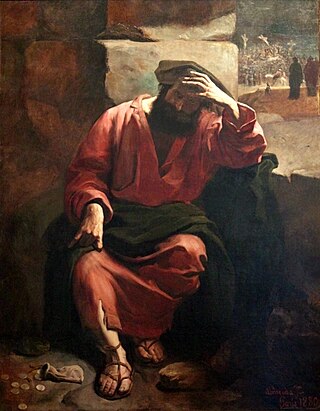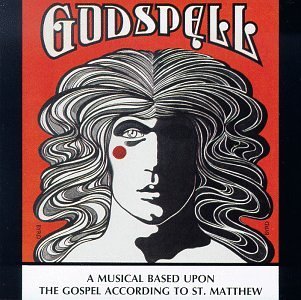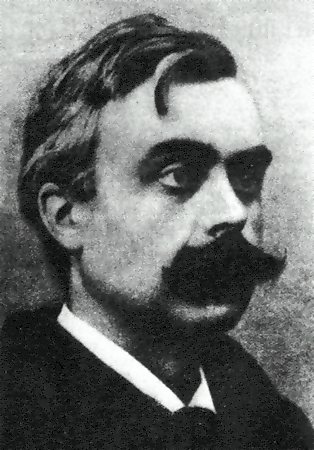Related Research Articles

Jorge Francisco Isidoro Luis Borges Acevedo was an Argentine short-story writer, essayist, poet and translator regarded as a key figure in Spanish-language and international literature. His best-known works, Ficciones (transl. Fictions) and El Aleph, published in the 1940s, are collections of short stories exploring motifs such as dreams, labyrinths, chance, infinity, archives, mirrors, fictional writers and mythology. Borges's works have contributed to philosophical literature and the fantasy genre, and have had a major influence on the magic realist movement in 20th century Latin American literature.

Judas Iscariot was—according to Christianity's four canonical gospels—a first-century Jewish man who became a disciple and one of the original Twelve Apostles of Jesus Christ. Judas betrayed Jesus to the Sanhedrin in the Garden of Gethsemane, in exchange for 30 pieces of silver, by kissing him on the cheek and addressing him as "master" to reveal his identity in the darkness to the crowd who had come to arrest him. In modern times, his name is often used synonymously with betrayal or treason.

The Last Temptation of Christ or The Last Temptation is a historical novel written by Nikos Kazantzakis, first published in its original Greek in 1955 before being translated into English in 1960. The novel depicts the life of Jesus and his struggles with various forms of temptation, including fear, doubt, depression, reluctance, and lust.
The son of perdition is a phrase associated with a demoniacal title that appears in the New Testament in the Gospel of John 17:12 and in the Second Epistle to the Thessalonians 2:3.

Godspell is a musical with music and lyrics by Stephen Schwartz and a book by John-Michael Tebelak. The show is structured as a series of parables, primarily based on the Gospel of Matthew, interspersed with music mostly set to lyrics from traditional hymns, with the passion of Christ appearing briefly near the end.

Wormwood: Curious Stories from the Bible is a concept album released in 1998 by American art rock band The Residents. The album's purpose is to retell some of the more "curious" stories in the Bible, not to condemn the stories, but to give a greater understanding to them.
A fictional book is a text created specifically for a work in an imaginary narrative that is referred to, depicted, or excerpted in a story, book, film, or other fictional work, and which exists only in one or more fictional works. A fictional book may be created to add realism or depth to a larger fictional work. For example, George Orwell's novel Nineteen Eighty-Four has excerpts from a book by Emmanuel Goldstein entitled The Theory and Practice of Oligarchical Collectivism which provides background on concepts explored in the novel.

Hjalmar Emil Fredrik Söderberg was a Swedish novelist, short story writer, playwright and journalist. His works often deal with melancholy and lovelorn characters, and offer a rich portrayal of contemporary Stockholm through the eyes of the flaneur. Söderberg is regarded as one of the greatest writers in Swedish literature. His works are translated to more than twenty languages.
"The Approach to Al-Mu'tasim" is a fantasy short story written in 1935 by Argentine writer Jorge Luis Borges. In his autobiographical essay, Borges wrote about "The Approach to Al-Mu'tasim", "it now seems to me to foreshadow and even to set the pattern for those tales that were somehow awaiting me, and upon which my reputation as a storyteller was to be based."

Ficciones is a collection of short stories by Argentine writer and poet Jorge Luis Borges, originally written and published in Spanish between 1941 and 1956. Thirteen stories from Ficciones were first published by New Directions in the English-language anthology Labyrinths (1962). In the same year, Grove Press published the entirety of the book in English using the same title as in the original language. "The Approach to Al-Mu'tasim" originally appeared published in A History of Eternity (1936). Ficciones became Borges's most famous book and made him known worldwide.

Labyrinths is a collection of short stories and essays by Argentine writer and poet Jorge Luis Borges. It was translated into English, published soon after Borges won the International Publishers' Prize with Samuel Beckett.

Mark 14 is the fourteenth chapter of the Gospel of Mark in the New Testament of the Christian Bible. It contains the plot to kill Jesus, his anointing by a woman, the Last Supper, predictions of his betrayal, and Peter the Apostle's three denials of him. It then begins the Passion of Jesus, with the garden of Gethsemane and Judas Iscariot's betrayal and Jesus' arrest, followed by Jesus' trial before the Sanhedrin and Peter's denials of Jesus.

The Gospel of Judas is a non-canonical Gnostic gospel. The content consists of conversations between Jesus and Judas Iscariot. Given that it includes late 2nd-century theology, it is widely thought to have been composed in the 2nd century by Gnostic Christians. The only copy of it known to exist is a Coptic language text that has been carbon dated to 280 AD, plus or minus 60 years. It has been suggested that the text derives from an earlier manuscript in the Greek language. An English translation was first published in early 2006 by the National Geographic Society.

The gospel or good news is a theological concept in several religions. In the historical Roman imperial cult and today in Christianity, the gospel is a message about salvation by a divine figure, a savior, who has brought peace or other benefits to humankind. In Ancient Greek religion, the word designated a type of sacrifice or ritual dedication intended to thank the gods upon receiving good news.

Léon Bloy was a French Catholic novelist, essayist, pamphleteer, and satirist, known additionally for his eventual defense of Catholicism and for his influence within French Catholic circles.

Matthew 26 is the 26th chapter of the Gospel of Matthew, part of the New Testament of the Christian Bible. This chapter covers the beginning of the Passion of Jesus narrative, which continues to Matthew 28; it contains the narratives of the Jewish leaders' plot to kill Jesus, Judas Iscariot's agreement to betray Jesus to Caiphas, the Last Supper with the Twelve Apostles and institution of the Eucharist, the Agony in the Garden of Gethsemane and the subsequent vindication of Jesus' predictions, of betrayal by one of the twelve Apostles, and that he will, in the Denial of Peter, be disowned by his closest follower, Saint Peter.

The arrest of Jesus was a pivotal event in Christianity recorded in the canonical gospels. It occurred shortly after the Last Supper, and immediately after the kiss of Judas, which is traditionally said to have been an act of betrayal since Judas made a deal with the chief priests to arrest Jesus. The event ultimately led, in the Gospel accounts, to Jesus's crucifixion.

Godspell is a 1973 American musical comedy-drama film, an adaptation of the 1971 Off-Broadway musical Godspell, created by John-Michael Tebelak with music and lyrics by Stephen Schwartz.
Biathanatos is a work by the English writer and clergyman John Donne. Written in 1608 and published after his death, it contains a heterodox defense of "self-homicide" (suicide), listing prominent Biblical examples including Jesus, Samson, Saul, and Judas Iscariot. Thomas De Quincey responds to the work in his "On Suicide", and Jorge Luis Borges responds in "Biathanatos".

The Book of Sand is a 1975 short story collection by Argentine writer Jorge Luis Borges. In the author's opinion, the collection, written relatively late in his career — and while blind — is his best book. This opinion is not shared by most critics, many of whom prefer his other works such as those in Ficciones (1944).
References
- ↑ Bell-Villada, Gene H. Borges and his fiction. p. 127.